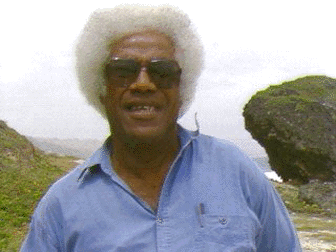

photo courtesy Banyan Limited
Perhaps the most famous writer to emerge from the island of Barbados, the now grandfatherly George Lamming was born on June 8, 1927. Though he grew up on the island, like so many West Indian writers he eventually left, emigrating to England in 1950. There, after spending some time working in a factory and broadcasting for the BBC, Lamming became a leader in a Caribbean renaissance that took place in England, along with other exiles like V.S. Naipaul. Since then he has traveled much, returning often to the West Indies but also serving as a visiting professor at the Universities of Texas and Pennsylvania.
Lamming's writing career has encompassed several genres, gaining acclaim not simply for fiction but also poetry and critical work. His fiction has taken up the familiar Caribbean search for identity, as Lamming (in such works as In the Castle of My Skin) uses details from his own autobiography to get at the root of the West Indian soul. However, in these explorations of identity and the effects of history, Lamming comes not only to writing of the West Indian psyche, but of humans in general. Despite critics' accusations of using his novels as soapboxes from which he preaches his Marxist ideology, Lamming's efforts to tie together collective history through the shared humanity of his characters ensure that his novels remain skillfully crafted and multifaceted.
Contemporary Authors, New Revision Series. Edited by H. May and J.G. Lesniak. Detroit: Gale Publishing, 1989, Volume 26.
Last modified 1998